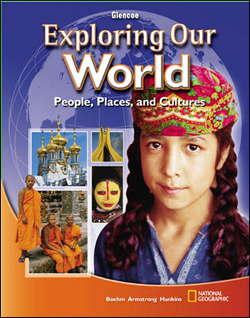
Exploring Our World People, Places, and CulturesChapter 12: Europe TodayChapter OverviewsThe countries of northern Europe have developed diverse economies and high standards of living. In the United Kingdom, 9 out of 10 people live in cities. London, a city of 7.6 million residents, is a world center of finance and business. The government is a constitutional monarchy and parliamentary democracy, and Scotland, Northern Ireland, and Wales have regional legislatures. The Republic of Ireland, the Catholic country that occupies the southern majority of the island of Ireland, is a separate country that won independence from Great Britain in 1922. The Irish economy relies on manufacturing. Disputes between Northern Ireland Protestants and Irish Catholics over whether Northern Ireland should remain part of Great Britain are ongoing. Other northern European countries include the Scandinavian countries: Norway, Sweden, Finland, Denmark, and Iceland. They have similar cultures and standards of living that are among the highest in the world. Their economies are based on a mixture of agriculture, manufacturing, and service industries. In addition, they are welfare states that offer health care, child care, elder care, and retirement benefits to all citizens, so their people pay some of the highest taxes in the world. Today France and the Benelux countries (Belgium, the Netherlands, and Luxembourg) are important cultural, agricultural, and manufacturing centers. France is a democratic republic, and all three Benelux countries are parliamentary democracies with monarchs as heads of state. These four countries enjoy high standards of living and rely on both agriculture and manufacturing for their stable economies. Likewise, Germany and the Alpine countries of Switzerland, Austria, and Liechtenstein have prosperous economies. Germany is a global economic power and has the largest population of any European country. The Alps dominate the region and are important both to bring tourists to the countries and to supply resources such as timber and iron ore. Seas and mountains have influenced where people work and live in southern Europe. Spain and Portugal, on the Iberian Peninsula, are young democracies with growing economies. Tourism, manufacturing, and service industries are all important to Spain's economy. Agriculture, especially grapes, is important to Portugal's economy; fishing is also an important contributor. Italy, on the other hand, has changed from a mainly agricultural country into a leading industrial economy. Southern Italy is poorer and less industrialized than northern Italy. Italy's people live in urban areas and are Roman Catholic. Vatican City, located within Italy's borders and the smallest country in the world, is home to the Roman Catholic Church. Greece, located east of Italy, contains a mainland and about 2,000 islands. Most people are Greek Orthodox Christian and live in the cities of this democratic republic. Shipping is a major contributor to Greece's economy. After changes in government and economic policies, eastern European countries still struggle. Poland and the Baltic Republics have become democratic, while Belarus is still influenced by its Communist past. Poland's change to a market economy caused hardship to its people at first. Now its economy continues to improve. The Baltic Republics have also seen economic growth. Eastern Europe's central countries—the Czech Republic, Slovakia, and Hungary—were once under Communist rule but now are independent democracies with economies that are growing. However, the countries of southeastern Europe, such as Ukraine, still struggle. Ukraine has deep divisions among its people based on ethnic differences; the countries that once made up Yugoslavia also have ongoing ethnic conflicts. Romania's economy slumped after a bloody revolution that ousted the Communist leaders but thanks to its natural resources is now rebounding. |  |















